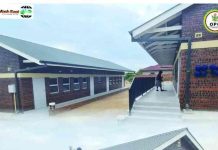Africa-Press – Zimbabwe. NYASHA, a nurse from Zimbabwe who works in the United Kingdom, thought she was finally making an investment in a house back in Harare when she discovered a “perfectly priced” stand in Ruwa in a WhatsApp group.
She was reassured by the “agent” that everything was fine, but only provided she paid a deposit by the weekend.
She sent US$6 000.
Both her money and the WhatsApp number vanished by Monday.
In Zimbabwe’s real estate market, Nyasha is only one of many people caught up in an unsettling and rapidly expanding trend.
Fraudsters are using urgency, distance and digital convenience to conduct increasingly sophisticated real estate scams as the demand for urban housing soars and diaspora investment floods in.
A booming market — and a booming scam industry
According to the real estate portal, Property.co.zw, the Zimbabwe Republic Police (ZRP) recorded property fraud cases valued at over US$15 million in 2024.
So far this year, the ZRP’s Fraud Division reported at least 140 cases of land sale fraud registered across Harare, Chitungwiza and
Ruwa.
These figures suggest the scam economy is not just opportunistic — it’s organised and expanding.
Hotspots and trends
Here are some of the areas seen as especially vulnerable:
Ruwa: Rapidly developing peri-urban town with high demand from buyers seeking cheaper stands. Social media listings flood the market.
Fraud reports tied to unapproved subdivisions are increasing.
Chitungwiza: High density, many new land allocations, infrastructure pressure.
Reports show duplication of plot sales, informal transfers and transactional urgency.
Designated areas often lack proper servicing or council approval.
Mt Pleasant and surrounds: A long-running case: the “Mount Pleasant Heights Phase 2 (Lot 4 Zizalisari)” scam has left hundreds of buyers waiting without title deeds after 17 years.
This shows even established suburbs are not immune when developers or vendors act unscrupulously.
Hopley/Domboshava: Though older data, studies highlight heavy risk in these peri-urban zones where land transactions are frequent but governance is weak.
New developments here often suffer from irregular allocations, deficient servicing, and delayed approvals.
Why is the risk high in these areas, one might ask?
Property.co.zw flags high demand coupled with limited formal supply, which creates opportunities for scammers.
Many buyers are remote (diaspora) and cannot inspect properties in person.
Listings via social media and WhatsApp bypass traditional checks.
Legal and regulatory frameworks in peri-urban land are weak or inconsistently enforced.
Research shows that informal processes dominate in many peri-urban areas.
Reports reveal that land-governance corruption, that is, illegal allocations and manipulation of approvals, is particularly severe in Harare’s peri-urban belt.
How not to get conned
As before, these are non-negotiable:
lTitle deed or valid subdivision permit — verified by a licensed conveyancer.
lConfirm the seller or developer has paid required local authority fees and serviced the stand (roads, water, sewer).
lAgent registration (membership with the Real Estate Institute of Zimbabwe or equivalent). Payment ONLY to trust accounts, with receipt and legal “agreement of sale”.
lNo rush. If you’re being pressured to pay before documentation is before you — stop.
The rule for 2025: Trust the process more than the price.
Scammers rely on emotion, diaspora distance, low and special offers, and urgency.
If something looks too good to be true, it probably is.
If you’re paying before paperwork, you’re in a dangerous place.
Zimbabweans everywhere — from Mbare to Manchester — deserve security when they invest in land or homes.
But in 2025, it will take extra vigilance.
Nyasha’s story ended without a home — but let her experience be a warning to others.
Quick buyer checklist
lVerify title through Deeds Office
lConfirm council approvals and servicing
lDeal only with licensed agents
lPut payments through a trust account
lDon’t allow shortcuts or rushes
For More News And Analysis About Zimbabwe Follow Africa-Press






